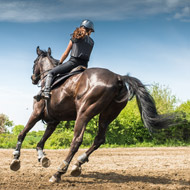Warning over risk to horses from plastic granulate

Some granulate may be cross-contaminated with non-plastic elements, which could be harmful to horses and riders.
Horses and riders could be at risk from plastic granulate being sold as an alternative surface for equestrian centres in Yorkshire, the Environment Agency (EA) has warned.
The substance is a waste material derived from recycling cable sheathing and Waste Electrical and Electronic Equipment (WEEE). EA says some waste producers and brokers are marketing it as a base material for horse maneges and track surfaces.
However, no legal route is available for its use in this context, unless an Environmental Permit is acquired.
Some plastic granulate may be cross-contaminated with non-plastic elements, such as metal fragments and glass, meaning surfaces containing these could be harmful to horses and riders.
Plastics in these substances can also contain Persistent Organic Pollutants, phthalates and lead stearate. Weathering may cause these to be leached into the environment, potentially contaminating land and ground water.
EA officer Greg Deakin urged people with equestrian facilities to carefully consider the use of this material.
“It might be offered free of charge or for a small delivery fee,” he explained, “but it is an offence under the Environmental Permitting Regulations to use this waste without appropriate environmental controls.
“If you’re found to have plastic granulate waste deposited on your land without the appropriate Environmental Permit awarded by the Environment Agency, you could be fined and be liable for the cost of its disposal.”
EA is advising people to contact them if they are approached and offered this material, if they do not have a suitable Environmental Permit. Tel: 03708 506 506 and ask to speak to your local waste team, or email the details to enquiries@environment-agency.gov.uk



 The Animal and Plant Health Agency (APHA) has updated its online reporting service for dead wild birds.
The Animal and Plant Health Agency (APHA) has updated its online reporting service for dead wild birds.